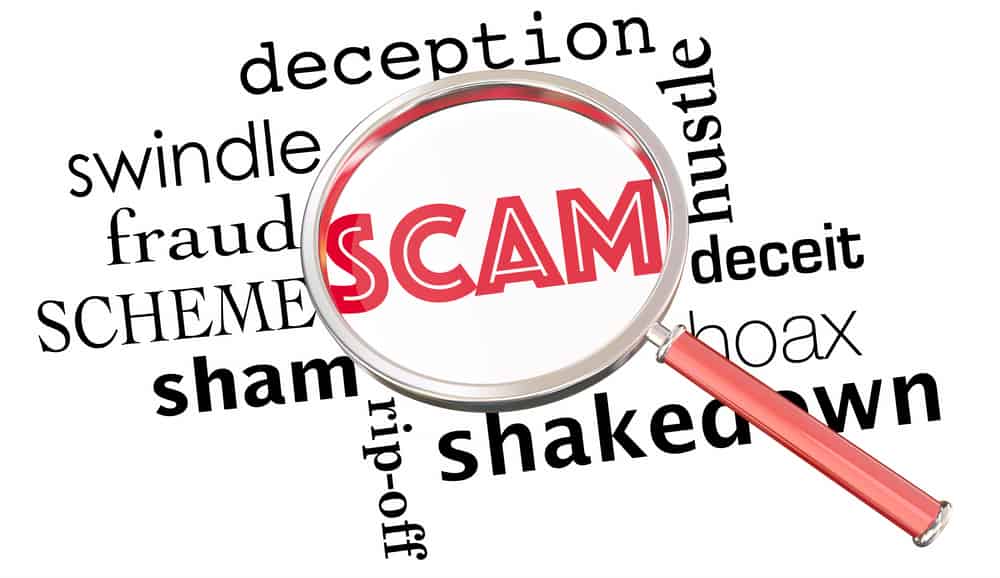Holidays are a busy time for all of us, including the scammers and fraudsters working overtime right now to cheat you out of your money, even your identity. Here are types of holiday scams to watch out for.
Email scams
We couldn’t deliver your package: Spam emails from senders with names like FedEx SmartPost and FedEx 2Day A.M. might arrive in your inbox, but you don’t recall ordering anything. But checking the sender’s address reveals that the mail came from a website that is based in another country. Bottom line: Be wary of any email that comes in with a link. If in doubt about a package delivery, contact FedEx, UPS, even the U.S. Postal Service directly. Do not click the link.
Letter from Santa: Offers from sketchy web addresses offering personalized letters to Santa are often scams. Be especially wary of any email or website claiming to be the “official” letter from Santa site unless it’s from the United States Postal Service. You can create a reply from Santa and have it mailed to your child by following USPS directions here. And it is free, except for the stamp. Bottom line: Use the link above and ignore everything else that you find on the Internet or that comes into your email.

Update your billing: A sender named “yoigheseerifartho” tells you your credit card for Paypal is out of date. The email might even be sent to an address you don’t use for Paypal. Bottom line: Remember which email addresses you use for banking and online purchases, so you can recognize a scammer or phishing fraud sending to the wrong one. You might even want to set up a special address for holiday purchases to use now and discard after the holidays. Always access the business website and login to make any changes to your account.
Fake apps: Beware of apps that appear to be from your favorite stores but actually are designed to steal your credit card information. The scammer creates an app that appears to be a department store or other company offering discounts on name-brand merchandise. You think you are shopping with a major retail company, and you enter your credit card information to take advantage of deals. But you’re actually giving away sensitive data. Other scams offer holiday-themed programs that can steal information behind the scenes. Bottom line: Before you download an app, check the publisher to make sure the app is what it says it is. Beware of apps with poor English translations, recent publication, lack of reviews and no previous versions. Before you download an app, check the store’s website. It’s always best to follow the link from a retailer’s verified site.
Free products: Emails, text messages and social media posts that promise free merchandise from downloadable books to luxury cruises can be information grabbers. Some install malware when you click on a link for more details. Others lead to online surveys designed to steal personal information. Some require a credit card to cover vague shipping and handling fees or reservation deposits. Bottom line: Check the manufacturer’s or provider’s website for information about the offer. If it isn’t listed, assume that it is a scam.
Illegal computer use: The FBI has been swamped with complaints about what’s being called “ransomware.” It works this way: You get a bogus email supposedly from the FBI saying your Internet address was identified by the FBI or Department of Justice Computer Crime section as having been associated with illegal online activity, and your computer access is being locked. In order to unlock it, you are directed to pay a fine to avoid criminal charges. If you click, your computer will be infected with malware. Bottom line : Don’t click.
Shortened URLs: Shortened URLS in an email could direct you to a malicious website. We’ve all seen, even used, bit.ly, ow.ly and tinyurl to shorten long links on social media sites, so we are usually trusting when it comes to clicking on one of the links. Bottom line: Make sure you know the original source before clicking on a shortened URL. Some of the shortening services, like TinyURL, offer preview features.Other sites such as unfurlr.com will show you the original source.If you have any doubt about the link, use these services before clicking.
Help, my wallet was stolen: You get an email from a “friend” who says his wallet was stolen, and he needs you to wire money to the website included in the email. Bottom line: Contact your friend offline or via another email address to ensure that his or her address book wasn’t hijacked by a scammer.
Other scams
Doorstep theft. To avoid being one of the crowd targeted by “porch pirates,” set up a delivery that requires a signature upon receipt. If you order from Amazon, have your package delivered for free to an Amazon Locker location, then pick it up using a special code. Simply find a locker and add the location as a shipping option when you make a purchase.
Toll-free numbers that aren’t free: You might receive a phone call offering to consolidate or reduce your debt load or to handle disputes over a bill. Or the caller or automated voice will tell you you have outstanding bills that must be handled right away. You are redirected to a 900 number based overseas that can cost you $2 a minute or more. Bottom line: Never dial a prompt for “more information” or “shop now” from a caller, especially if it is a pre-recorded voice. The National Consumers League fraud prevention website recommends you can protect yourself year-round by asking your phone company to block outgoing 900 numbers from your phone.
I love you: Romance scams are on the rise. According to the FBI, in 2020, more than 23,000 victims reported over $605,000,000 in losses. These potential victims freely post personal details on dating and social media sites. Perpetrators establish a relationship with the intended victim, gain her trust, and eventually propose marriage. He asks to meet in person, but never does. Then he asks for money, sometimes saying he needs the cash to come visit. Bottom line: Never go offline; email to continue a conversation. And never send money to someone you don’t know personally. Read more about this scam and how to prevent it.
Online shopping: Don’t be too busy to shop on a secure website that encrypts your personal information, such as your address and credit card number. Online shopping can save us time and even money, but beware of sites that grab important information. Bottom line: look for https at the beginning of the web address (the “s” is for secure). Some websites use encryption only on the sign-in page, but the Federal Trade Commission advises that if any part of your session is not encrypted, the entire account could be vulnerable. Look for https on every page of the site you’re on, not just where you sign in.
Charitable giving: We all love to be charitable, especially to charities involving children. But don’t allow your goodwill to get you get ripped off. Beware of callers claiming to represent a charity and asking for credit card information over the phone. I make it a policy of refusing to give to a charity that wastes donation dollars by sending me unwanted and unsolicited little bribes such as personalized return mail stickers or notepads. Create an annual budget that allows for charitable gifts, and stick with the organizations you can trust. Bottom line: Before you give, check out the charity’s rating with one of the charity rating services. Check out Charity Navigator and Charity Watch, both of which rate an organization based on how much of donor money actually goes to programs and how much pays for fundraising and office salaries.
Help get me out of jail and don’t tell mom: A person claiming to be a teenage or college-age grandchild, niece or nephew calls asking for help. He needs money to get out of jail, or is stranded without a way to return home. The Elder Abuse unit of the Manhattan District Attorney’s office in NYC says the “grandchild” scam is targeting seniors, usually over the age of 70, who often are more trusting and less tech savvy than others. Scammers pull at the person’s emotions and are very good at convincing the person that their situation is dire. The scam is also conducted via email or social media sites, and there are more attempts during the holidays. Bottom line: Hang up, or block the person on social media. Report the incident to the FTC at ftc.gov/complaint or call 1-877-FTC-HELP.
For more Living on the Cheap tips:
- Make extra money for the holidays
- Save money and time over the holidays
- 13 practical gifts to give this season
- Thoughtful holiday gifts on a budget
- Make your own holiday wreath

